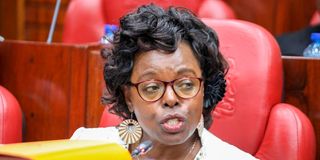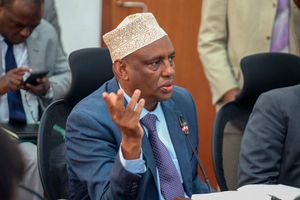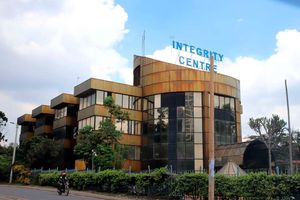
The Controller of Budget Margaret Nyakang'o before the Devolution and Intergovernmental relations committee at County Hall, Nairobi on April 8, 2025.
County governments more than doubled the number of accounts they operate in commercial banks during the 12 months to March 2025, in 1,763 new openings that have seen the devolved units extend a law breach that hurts accountability efforts.
Analysis of the latest official data from the Controller of Budget (CoB) shows that counties were running 3,431 accounts at commercial banks at the end of March this year, up from 1,668 in March last year.
The number could be higher given that Kakamega and Kilifi counties did not disclose the number of accounts they were operating by the end of the reporting period.
Counties are, under the law, prohibited from operating accounts in commercial lenders, with the rules only allowing the accounts to be maintained at the Central Bank of Kenya (CBK) for visibility of cash movements.
Limited exceptions are granted for imprest accounts for petty cash and revenue collection.
Accounting officers are required to obtain written authorisation from their respective county treasury offices before opening a commercial bank account, with the latter being required to send a copy of this to the COB and the auditor general.
“Regulation 82(1) (b) of the Public Finance Management (PFM) (County Governments) Regulations, 2015, requires county government bank accounts to be opened and maintained at Central Bank of Kenya, with exceptions for imprest and revenue collection accounts,” noted the COB in the report.
“County governments are not complying with Regulation 82, as not all accounts are maintained at the Central Bank, and authorisation letters are not being shared with the Controller of Budget.”
At the end of March, Nakuru led with the highest number of running illegal accounts at 292, followed by Baringo (282), Machakos (230), and Embu (222), at a time when only Narok and Vihiga were compliant with the governing rule.
Most counties use commercial accounts for hospital facilities, vocational training centres, car loans, and mortgage schemes, as well as established funds such as bursaries.
The growing number of bank accounts operated by the devolved governments has made it increasingly difficult for the COB to track public expenditure amid concerns that some of the accounts are used for private dealings thus exposing taxpayers to losses and legal suits.
In May last year, COB Margaret Nyakang’o lost a push initiated in 2021 to have her office granted real-time access to the bank accounts that counties hold at the CBK, in a development that now allows counties to escape scrutiny amid damning reports of massive corruption.








